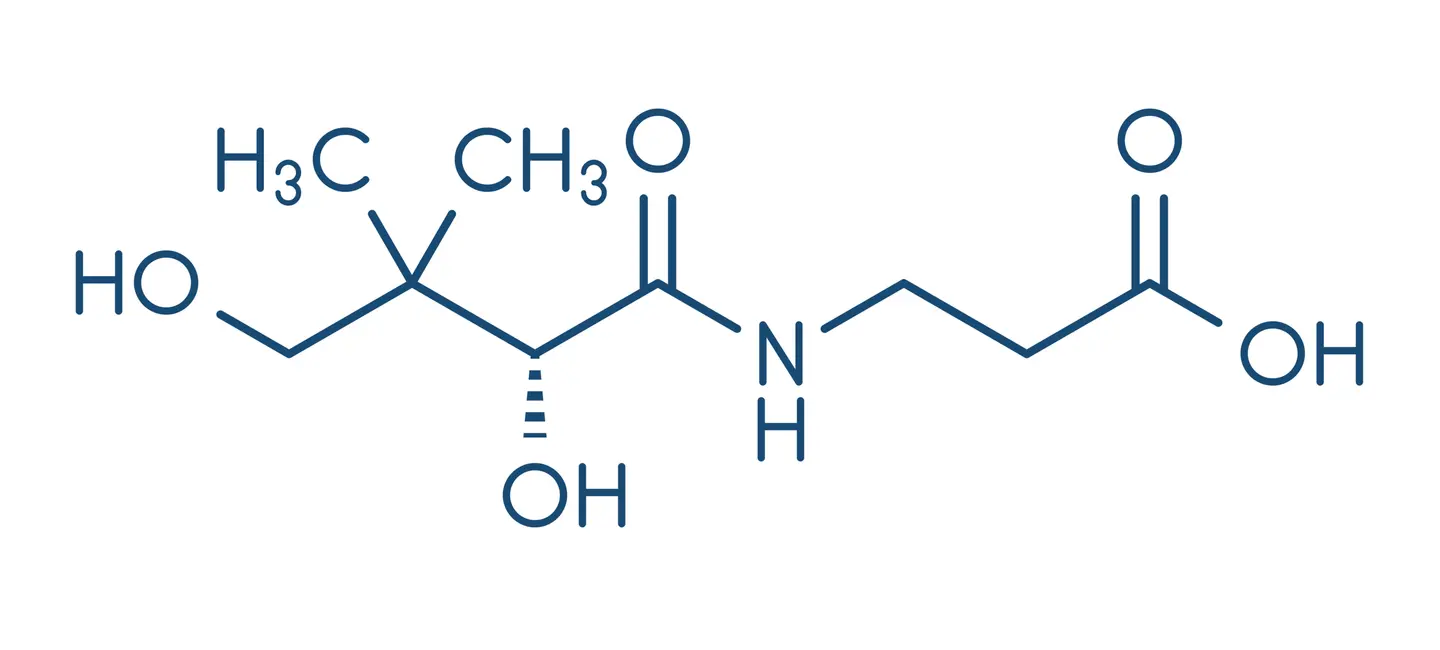
Pantothenic acid is vitamin B5. It is widely found in both plants and animals including meat, vegetables, cereal grains, legumes, eggs, and milk.
Pantothenic acid helps the body utilize carbohydrates, proteins, and lipids. It is also important for maintaining healthy skin. Vitamin B5 is available as D-pantothenic acid, as well as dexpanthenol and calcium pantothenate, which are chemicals made in the lab from D-pantothenic acid.
People most commonly use pantothenic acid for pantothenic acid deficiency. Dexpanthenol, a chemical similar to pantothenic acid, is used for skin irritation, nasal swelling, wound healing, and other conditions, but there is no good scientific evidence to support these uses.
Is It Effective?
NatMed Pro rates effectiveness based on scientific evidence according to the following scale: Effective, Likely Effective, Possibly Effective, Possibly Ineffective, Likely Ineffective, Ineffective, and Insufficient Evidence to Rate.
- Pantothenic acid deficiency. Taking 5-10 mg of pantothenic acid by mouth daily prevents and treats pantothenic acid deficiency.
- Skin damage caused by radiation therapy (radiation dermatitis). Applying dexpanthenol, a chemical similar to pantothenic acid, to irritated skin does not seem to reduce skin damage caused by radiation therapy.
There is interest in using pantothenic acid for a number of other purposes, but there isn't enough reliable information to say whether it might be helpful.
Is it Safe?
When taken by mouth: Pantothenic acid is likely safe for most people. The recommended amount for adults is 5 mg per day. Larger amounts (up to 1 gram) seem to be safe for most people. But taking larger amounts increases the chance of side effects such as diarrhea.
When applied to the skin: Pantothenic acid and its related chemicals are likely safe when used short-term.
When given as a nasal spray: Dexpanthenol is possibly safe when used short-term.
When applied into the eye: Dexpanthenol is possibly safe when used short-term.
Special Precautions & Warnings:
Pregnancy: Pantothenic acid is likely safe when taken by mouth. The recommended intake is 6 mg daily during pregnancy.
Breast-feeding: Pantothenic acid is likely safe when taken by mouth. The recommended intake is 7 mg daily during breast-feeding.
Children: It is likely safe for children to take pantothenic acid by mouth and apply pantothenic acid to the skin.
It is not known if Pantothenic Acid interacts with any medicines. Before taking Pantothenic Acid, talk with your healthcare professional if you take any medications.
There are no known interactions with herbs and supplements.
There are no known interactions with foods.
Pantothenic acid is widely found in foods, including meat, vegetables, cereal grains, legumes, eggs, and milk. It's recommended that adults consume 5 mg pantothenic acid daily. During pregnancy, 6 mg should be consumed daily; when breastfeeding, 7 mg should be consumed daily. Recommended amounts for children depend on age.
In supplements, pantothenic acid is typically used together with other B vitamins in vitamin B complex formulations. Dexpanthenol, a chemical similar to pantothenic acid, is available in makeup, hair products, ointments, creams, gels, nasal sprays and eyedrops. Speak with a healthcare provider to find out what dose might be best for a specific condition.
Acide D-Pantothénique, Acide Pantothénique, Ácido Pantoténico, Alcool Pantothénylique, B Complex Vitamin, Calcii Pantothenas, Calcium D-Pantothenate, Calcium Pantothenate, Complexe de Vitamines B, D-Calcium Pantothenate, D-Pantothenic Acid, D-Panthenol, D-Panthénol, D-Pantothénate de Calcium, D-Pantothenic Acid, D-Pantothenyl Alcohol, Dexpanthenol, Dexpanthénol, Dexpanthenolum, Pantéthine, Panthenol, Panthénol, Pantothenate, Pantothénate, Pantothénate de Calcium, Pantothenol, Pantothenylol, Vitamin B5, Vitamin B-5, Vitamina B5, Vitamine B5.
Information on this website is for informational use only and is not intended to replace professional medical advice, diagnosis, or treatment. While evidence-based, it is not guaranteed to be error-free and is not intended to meet any particular user’s needs or requirements or to cover all possible uses, safety concerns, interactions, outcomes, or adverse effects. Always check with your doctor or other medical professional before making healthcare decisions (including taking any medication) and do not delay or disregard seeking medical advice or treatment based on any information displayed on this website.
© TRC Healthcare 2024. All rights reserved. Use and/or distribution is permitted only pursuant to a valid license or other permission from TRC Healthcare.
